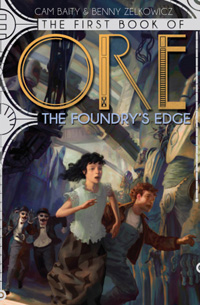| ________________
CM . . .
. Volume XX Number 31. . . .April 11, 2014 
 |
The Foundry’s Edge. (The Book of Ore, Bk. 1).
Cam Baity & Benny Zelkowicz.
New York, NY: Disney/Hyperion (Distributed in Canada by Hachette Book Group Canada), 2014.
450 pp., hardcover & eBook, $17.99 (hc.)
ISBN 978-1-4231-6227-8 (hc.), ISBN 978-1-4231-7917-7 (eBook).
Subject Headings:
Science fiction.
Adventure and adventurers-Fiction.
Metals-Fiction.
Fathers and daughters-Fiction.
Kidnapping-Fiction.
Grades 3-7 / Ages 8-12.
Review by Rob Bittner.
*** /4
Reviewed from Advance Reading Copy.
|
| |
|

excerpt:
The man in the fog was watching her. He was across the street, just outside a pool of street light, standing as still as the ghostly birch trees that surrounded him. At first Phoebe dismissed it as an odd combination of shadows, perhaps created by rays of porch light streaming through the bronze gates of Plumm Estate. But the longer she stared, the more the stranger seemed to peel out of the gloom.
Phoebe parted the shimmering drapes and pressed her nose against the window to get a better look. From her third-story bedroom, she could just barely make him out: a sharp black suit and bowler hat, a pale face with a thick curving mustache, and round black spectacles like two holes punched in his face.
Twelve-year-old Phoebe Plumm lives a life of luxury, lounging around the Plumm estate, playing pranks on Micah Tanner, a servant who does nothing but get on her nerves. Her father, Dr. Jules Plumm, is the chief engineer at The Foundry, the corporation responsible for all technological advancement and the creation of metal production for Meridian. Dr. Plumm is constantly away on trips, but the most recent one has seen him gone for over three months already. Phoebe is getting restless, and it doesn’t help that she is seeing strangers in the mist outside her window. When her father shows up unexpectedly one night, suitcases packed, she gets seriously worried. Things quickly get out of control when father and daughter are abducted. Micah, who managed to avoid capture, follows the kidnappers through Meridian to The Foundry.
When Micah helps Phoebe escape her captors, the two attempt to follow and rescue Dr. Plumm, but they find themselves transported to a world of living metal. Micah and Phoebe notice that this world is being plundered and devastated to provide Meridian with all of their comforts and technological innovations. The two young adventurers partner with a strange guide named Dollop and make their way across the alien landscape to rescue Phoebe’s father from the terrible and mysterious Citadel.
The book’s authors are very visual storytellers, creating lush and imaginative landscapes and memorable characters. The language is inventive, as is the world of living metal in which the young heroes find themselves. The plot is fast-paced, the subject is intriguing, and the overall story is very much an allegory for environmental debate in a contemporary North American context. At times, the action does seem over-the-top, more like a special-effects laden movie than anything, but I suppose such style can be expected from two authors working in visual media and television.
Characterization is another strong suit in this book. Phoebe and Micah are both complex individuals, slowly growing throughout the course of the narrative. Phoebe progresses from being a spoiled brat with a desire to keep Micah subservient to her, to a young woman who wishes to save a world from destruction and who genuinely cares for Micah and her father, as well as the fate of a world she barely knows. Micah changes from an annoying and competitive child to an assertive and likeable young man who wants to help the inhabitants of the strange new world in which he is trapped.
Dollop, Phoebe and Michah’s guide in the new world, is constantly searching for his purpose in life, and while he is helpful to the plot, he comes across as overly goofy or silly at times. The “bad guys” are truly nefarious, mirroring real-life corporate greed and lack of concern for the environment. Though the allegory is, at times, heavy-handed, the novel manages to keep from being overly didactic the majority of the time.
Aside from the small number of concerns mentioned earlier, this is a wonderfully fast-moving, imaginative, and explosive allegory of corporate greed and environmental destruction for today’s politically aware young readers.
Recommended.
Rob Bittner recently graduated from the MA in Children’s Literature program at The University of British Columbia and is now a PhD student in Gender, Sexuality, and Women’s Studies at Simon Fraser University in Burnaby, BC.

To comment
on this title or this review, send mail to cm@umanitoba.ca.
Copyright © the Manitoba Library Association. Reproduction for personal
use is permitted only if this copyright notice is maintained. Any
other reproduction is prohibited without permission.
NEXT REVIEW |
TABLE OF CONTENTS FOR THIS ISSUE
- April 11, 2014.
AUTHORS |
TITLES |
MEDIA REVIEWS |
PROFILES |
BACK ISSUES |
SEARCH |
CMARCHIVE |
HOME |
